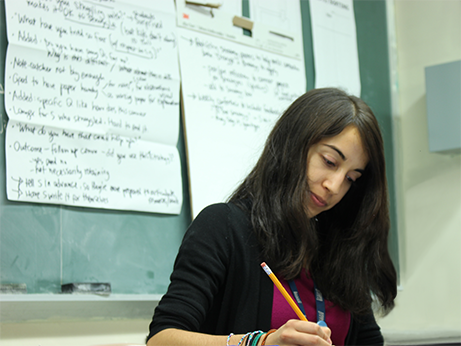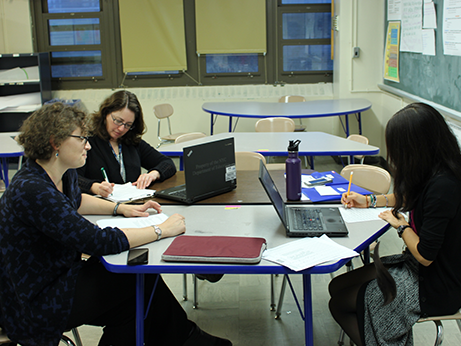What We Do: Design Projects >> Strength-Based Culture
Cultivating a Culture of Persistence at Bronx Bridges High School
How do we actually teach persistence? As more and more research indicates the critical role this habit of mind plays in student achievement, educators are increasingly searching for tangible strategies to strengthen it in their classrooms. In 2015, Bronx Bridges High School decided to make answering that question a focus. To do that, they joined the Advanced Academic and Personal Behaviors Institute (AAPBI), an initiative led by the NYC Department of Education’s Office of Postsecondary Readiness in partnership with Eskolta, dedicated to bringing cutting edge academic research on mindsets like persistence into the classroom.
During their first two years in the institute, counselor Alexandra DiAddezio and English teacher Pamela Papish focused on a series of small specific problems: first increasing the number of students who stay on task in the classroom, and then using that connection to build routines that encourage student ownership over their learning. They believed that by strengthening these qualities, they would simultaneously be reinforcing student persistence needed to push through academic challenges. Drawing on research and coaching support from Eskolta, the team at Bronx Bridges coalesced their learning to a series of strategies. One strategy, called “Genius Hour,” involves carving out time during class when students choose and designed an independent self-directed project, where the teacher regularly checks in with them on progress but does not hand hold or otherwise structure the learning. To complement this, the team developed a conferencing protocol to encourage students to identify their own struggles, and then articulate a strategy to improve.
As a result, students at Bronx Bridges have increased both their ability to work independently and to use revision and self-checking strategies to make their writing more coherent and complete. “You see students push themselves and explore new sides of themselves,” DiAddezio says of her work with the AAPBI. “It is a wonderful moment as an educator. These students are no strangers to change. Now we want them to be successful and to grow through these changes.”



